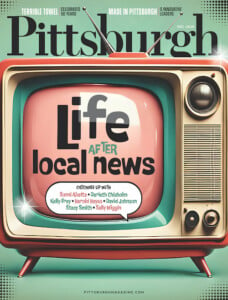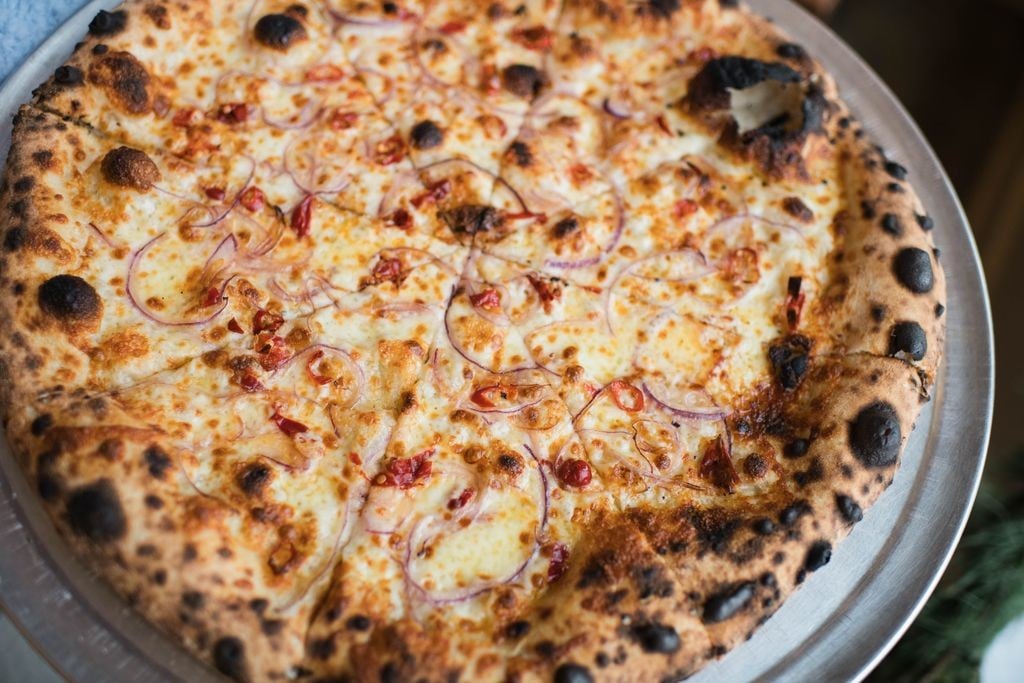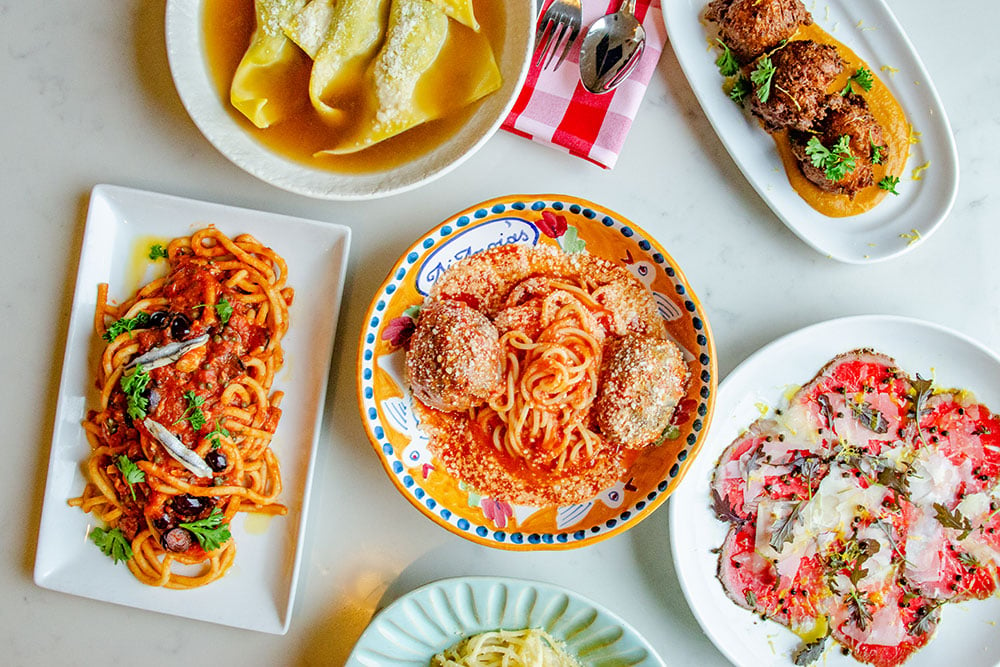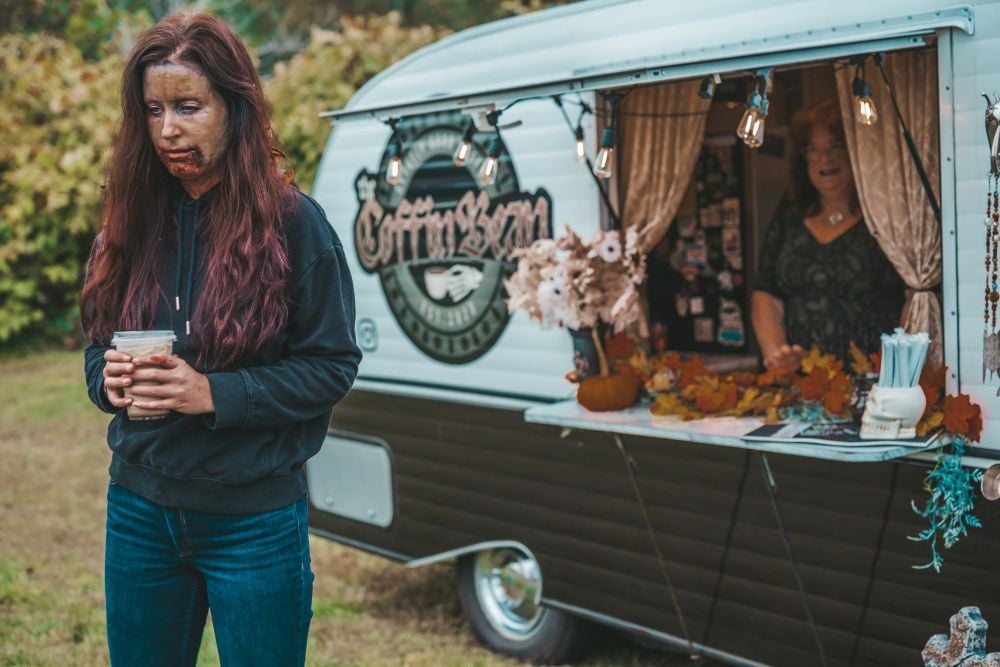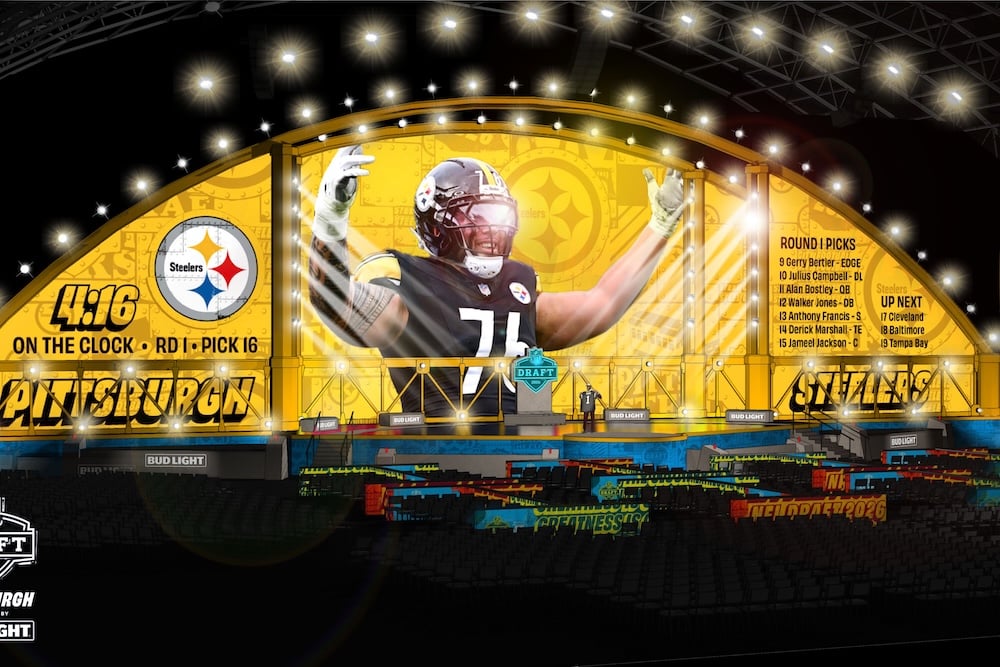Non-Alcoholic Drinks Don’t Have to Be Boring
From a boozeless bar to thoughtfully crafted mocktail menus, the Steel City is embracing sobriety one sip at a time.
It’s a raucous Friday night in the Strip District.
Revelers hop from one hot spot to the next, clink glasses on rooftop patios and swill Prohibition-era cocktails in a subterranean speakeasy.
I watch the Pittsburgh Party Pedaler zip by carrying a bride-to-be and her giggling entourage. Although a designated driver controls the wheel and brakes, the oversized bike is powered by people who are, quite obviously, not on the wagon. They hoot, holler, sip and spin their way down Penn Avenue, burning boozy calories as they consume them.
Meanwhile, I’m on my way to drink mocktails with my 15-year-old daughter and Count Dracula at The Chipped Fang, a vampire-themed pop-up bar where everyone’s Blood Alcohol Content is 0.0.
Sobriety — it doesn’t have to suck!
Scott Simmons, co-owner of ScareHouse and Bold Escape Rooms, created the spooky concept to give horror fans like me a sober space to visit during Halloween season, a time of year that’s typically awash in pumpkin beers, Appletinis and hot toddies.
A few miles up Penn Avenue in Garfield, Two Frays Brewery threw a boozeless costume bash so ghosts and goblins could go bump in the night without experiencing a monster hangover the next day. The brewery also hosted a dry Labor Day cookout, Thanksgiving Eve soiree and Pride Month party.
Up until a few months ago, it was the only brewery in Pennsylvania making and selling non-alcoholic beers. The universally accepted limit for NA beverages is 0.5% alcohol by volume, which is roughly the alcohol content of a very ripe banana. Because of state regulations, sales still are restricted to patrons 21 and over. (The term “alcohol-free” may be used on malt beverages containing zero alcohol.)
There is an array of styles in Two Frays’ You Do You Near-Beer series, from fruity wheats and IPAs to a porter and blonde. They distribute cans to area bars, restaurants and other breweries.
“If you make them well, they’re good,” says Mike Onofray, who co-founded the brewery with his wife, Jen, in 2021.
“In this industry that’s declining, nationally and locally, NA is the only growing portion.”
Related: John’s Echo Offers a Sober Space at Stage AE
The Rise of Non-Alcoholic Drinks
The fully NA Athletic Brewing Co., based in Connecticut, was the 10th largest craft brewery in 2023, according to a report by the Brewers Association, a not-for-profit trade organization of American beermakers. Pittsburgh Brewing Co., which recently opened a 170,000-square-foot production hub in Creighton, clocked in at No. 21 on the list.
Even though big-name brands such as Heineken, Corona and Budweiser are cranking out similar suds, Athletic is the only non-alcoholic brewery in the world that owns and operates fully dedicated facilities (they also have a sprawling new factory in San Diego).
Two Frays’ Head Brewer Lauren Hughes started drinking NA beers as part of a Dry January Challenge, joining multitudes of other people around the world who resolve to start the new year sober. Or, at least, sober-ish.
There was one problem: the taste, or lack thereof.
Hughes believes most NA beers on the market don’t live up to their boozier counterparts. As she would soon find out, crafting NA beer is just as labor intensive; the majority of small craft breweries across the country don’t have the time, money or resources to make it, let alone make it taste good.
Two Frays, a seven-barrel operation, did the research, accepted the challenge and released their first near-beer in January 2023.
They always try to have at least two on tap at all times, along with other teetotaler-friendly refreshments from local purveyors such as Jackworth Ginger Beer Brewery, Barmy Soda, TLC Libations and Arsenal Cider.
“It’s been good for business. It’s been good for the brand,” says Jen Onofray, whose husband, along with Mel Babitz of The Open Road, presented on the topic of non-alcoholic offerings in the craft beer space during 2024’s Barrel & Flow in the Strip District, one of the top beer festivals in the country. “I don’t think it’s a fad, but it’s not the future of beer; it’s part of beer. We’re doing a good thing.”
The first Monday of every month is Moderation Monday at the taproom, a completely non-alcoholic service down to the four-packs in the take-out cooler.
Babitz has partnered with the brewery since 2023, and sets up a table at the event to educate people on NA products from around the country. She’s an expert on the subject. In fact, she’s opening a NA bar right down the street.
Babitz is relocating The Open Road, the nation’s oldest non-alcoholic specialty retailer, from Allentown to Garfield.
The Open Road began as a series of NA pop-ups around Pittsburgh and grew into a 500-square-foot, brick-and-mortar shop in Allentown stocked with more than 400 products including wines, spirits, hop teas, seltzers, caffeinated drinks and those infused with hemp-derived CBD and THC.
As of press time, Babitz was working to re-open The Open Road for the holiday season. The new, 2,000-square-foot space on Penn Avenue, a former convenience store, houses a retail area and a bar. There’s no on-site kitchen, but customers can bring their own grub or patronize a rotating lineup of food trucks.
The Open Road, which recently launched a Honeycomb credit campaign, will also serve as a classroom of sorts for those who want to dip their toe in non-alcoholic waters.
Who Are the Customers?
I first interviewed Babitz in late 2019 as she was gearing up for Dry January. What’s changed in the NA industry since then?
“Everything,” she says with a laugh. “When I first launched, it wasn’t even an industry.”
“We will be serving everything non-alcoholic largely based on our retail selection, functional options and elevated, well-crafted non-alc cocktails,” says Babitz, who keeps many area bars supplied with alcohol alternatives. “We are going for a very approachable, comfy environment where everyone feels welcome.”
So who the heck is drinking this stuff?
Babitz says it’s a mixed bag that includes people in recovery, folks who want to improve their health and those who simply want to change the way they socialize. There’s a common perception that younger generations are propelling the NA movement forward, but Babitz says they aren’t for myriad reasons, including high costs.
“Younger people are drinking less because they can’t afford it, not because they’re drinking non-alcoholic beverages,” she explains, adding that the average mocktail costs as much as the kind that’ll get you tipsy. “We have a lot of older customers over 50 and 60.”
You’ll find thoughtfully crafted NA menus at every Richard DeShantz Restaurant Group property, including Meat & Potatoes, täk, Gi-Jin and the new Golden Gai.
Last holiday season, the company partnered with DreamLife Recovery, a Pennsylvania-based, clinician-owned center for those battling drug and alcohol addiction, on the DreamLife Mocktail. The beverage, a mix of orange blossom water, lemon and orange juices, vanilla syrup and seltzer, was created to promote sobriety and normalize conversations about it during a time when having a cup of cheer feels like a social obligation.
“We strive to make all of our spaces a welcoming environment for all, and the reminder that there is support and space within the hospitality community for sobriety is so incredibly important,” says Casey Henderlong, director of events and public relations for the restaurant group.
Making Space for All Tastes
At Lawrence Hall, a bar and multi-concept eatery on Butler Street in Lawrenceville, they’re leaning into the mindful drinking movement.
Katrina Tomacchio, along with her husband, Anthony, operates two businesses at Lawrence Hall: LOADED, an “American-fusion” eatery, and the modern Italian concept TOMA.
The Massachusetts native served as a NA beverage consultant for Boston-area restaurants and bars that were looking to reel in sober-curious customers. Five years ago she gave up booze herself. She shares her NA experiences on Instagram, where she bills herself as Pittsburgh’s Mocktail Queen. She hopes to make Lawrence Hall a destination for every kind of discerning sipper.
“First and foremost, you have to think about the guest experience. Whenever I work with a bar or restaurant client, I try to drive home the fact that inclusivity is key; we want the guest to walk away feeling like as much thought, care and effort went into their mocktail as would an alcoholic cocktail,” Tomacchio says. “I always love an eccentric garnish, and I try to get creative, within reason, because it just helps deliver that ‘wow’ factor.”
Lawrence Hall’s fall mocktail menu included the popular Capture of The Chesapeake, a campfire espresso martini made with cold brew, Lyre’s Coffee Originale Non-Alcoholic Spirit, Lyre’s White Cane Non-Alcoholic Spirit, graham cracker simple syrup and All The Bitter N/A Aromatic Bitters served with a torched marshmallow garnish.

THE CAPTURE OF THE CHESAPEAKE, MADE WITH COLD BREW, NON-ALCOHOLIC SPIRITS, NON ALCOHOLIC AROMATIC BITTERS, GRAHAM CRACKER SIMPLE SYRUP AND A TORCHED MARSHMALLOW. | PHOTO BY LAURA PETRILLA
Tomacchio says the sight of this extravagant beverage generated a lot of attention at the bar, setting off a chain reaction of inquiries. Patrons expressed shock over the drink’s mocktail status — and then ordered one for themselves.
It’s that kind of a-ha moment that makes Tomacchio beam with pride.
“Because when a bar program excels in the NA arena, it has the ability to show people that you don’t have to feel like you’re missing out, just because you’re not drinking,” she says.
“You can still go out, you can still socialize and meet your friends for drinks, and you can order something that isn’t just glorified soda or a Shirley Temple. Your drink is just as special, just as beautiful and just as delicious as everyone else’s. That’s what non-drinkers deserve, and I think that’s really important to provide. And as a non-drinker myself, I definitely feel like the right person to provide it.”
